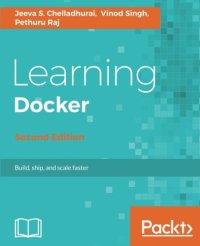
Ebook: Learning Docker
- Tags: programming
- Year: 2017
- Publisher: Packt Publishing
- Edition: 2nd Revised
- Language: English
- pdf
Docker lets you create, deploy, and manage your applications anywhere at anytime – flexibility is key so you can deploy stable, secure, and scalable app containers across a wide variety of platforms and delve into microservices architecture
About This Book
- This up-to-date edition shows how to leverage Docker’s features to deploy your existing applications
- Learn how to package your applications with Docker and build, ship, and scale your containers
- Explore real-world examples of securing and managing Docker containers
Who This Book Is For
This book is ideal for developers, operations managers, and IT professionals who would like to learn about Docker and use it to build and deploy container-based apps. No prior knowledge of Docker is expected.
What You Will Learn
- Develop containerized applications using the Docker version 17.03
- Build Docker images from containers and launch them
- Develop Docker images and containers leveraging Dockerfiles
- Use Docker volumes to share data
- Get to know how data is shared between containers
- Understand Docker Jenkins integration
- Gain the power of container orchestration
- Familiarize yourself with the frequently used commands such as docker exec, docker ps, docker top, and docker stats
In Detail
Docker is an open source containerization engine that offers a simple and faster way for developing and running software. Docker containers wrap software in a complete filesystem that contains everything it needs to run, enabling any application to be run anywhere – this flexibily and portabily means that you can run apps in the cloud, on virtual machines, or on dedicated servers.
This book will give you a tour of the new features of Docker and help you get started with Docker by building and deploying a simple application. It will walk you through the commands required to manage Docker images and containers. You’ll be shown how to download new images, run containers, list the containers running on the Docker host, and kill them.
You’ll learn how to leverage Docker’s volumes feature to share data between the Docker host and its containers – this data management feature is also useful for persistent data. This book also covers how to orchestrate containers using Docker compose, debug containers, and secure containers using the AppArmor and SELinux security modules.
Style and approach
This step-by-step guide will walk you through the features and use of Docker, from Docker software installation to the impenetrable security of containers.